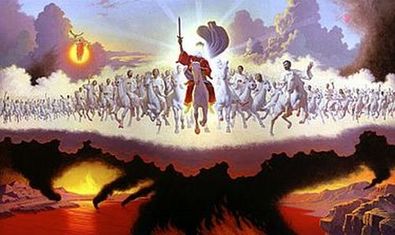| Jesus with his followers while the earth sits empty below. (photo credit) | Jesus of Nazareth wasn't exactly a philosopher in the strictest sense of the word, and I don't want to get into the supernatural claims of his religious followers (I think it's clear where I stand on those), but he had much to say about morality that has influenced billions of people for two millennia so his words must be carefully considered. Sadly, much of it does not hold up to the scrutiny of logic and reason. First though: a parable, since this was Jesus' preferred method of communicating his ideas. |
On one occasion, a very loud host on Fox News asked a theological expert, "This latest scientific research is tampering with the will of God. What does the bible have to say about this?"
The theological expert responded in a rising volume, "The liberal left don't want to hear this, but they are clearly risking damnation and the fires of hell for our world by ignoring the sacred words of God handed down to us from the prophets. Now that is a global warming I think we ought to really be afraid of."
A secular atheist had been offered up to the show as a punching bag for the audience. Rather than face the non-sequiters of his attackers, he asked a simple question. "If your orthodox policies led to everlasting heaven for your followers, but their lack of inclusive, cooperative progress led to the extinction of the species and the loss of untold billions of future beings, would god be happy with that?"
The theological expert replied with great certainty, "God works in mysterious ways and we must serve him no matter what the price is as the cost for entry into his kingdom of love."
The secular atheist told him, "Then go and do likewise with your flock."
-----------------------------------------------------------------------------
Jesus of Nazareth (7-2 BCE - 30-36 CE) is the central figure of Christianity and regarded as an important prophet of God in Islam. Most Christian denominations venerate him as God the Son incarnated. Most contemporary scholars of the historical Jesus consider him to have been an independent, charismatic founder of a Jewish restoration movement, anticipating a future apocalypse. Other prominent scholars, however, contend that Jesus' "Kingdom of God" meant radical personal and social transformation instead of a future apocalypse.
Survives
Parable of the Good Samaritan. No matter the nationality, help those who need it.
Parable of the Sower. Environments do need to be considered when teaching.
Parable of the Mustard Seed. Sometimes the tiniest idea can blossom into a large movement.
Parable of the Leaven. A single element can affect the rest of an entire group.
Parable of the Talents. Effort should be rewarded. Slothfulness should be punished.
Needs to Adapt
Parable of the Friend at Night. Asking for help is ok. Free riders must be thrown off.
Parable of the Strong Man. Since justice is a public good, government must own force.
Parable of the Barren Fig Tree. Repetition is necessary. Sometimes for more than four years.
Parables of Counting of the Cost. Planning is good, but trial and error is sometimes necessary.
Parable of the Unforgiving Servant. Forgiveness is good. Be prepared to play tit for tat.
Parable of the Rich Man and Lazarus. Aid to the poor is good. Rooting for hell is fruitless.
Parable of the Pharisee and the Publican. Humility over boasting, but speak up sometimes.
Parable of the Wedding Feast. More humility over boasting, but don’t be trampled.
Parable of the Faithful Servant. Great ability requires great effort, but waiting for god is a waste.
Parable of the Ten Virgins. Preparedness for life is a virtue, but not for a visit from a god.
Parable of the Sheep and the Goats. Charity is its own reward, not an avoidance of hell.
Judge not, that ye be not judged. For with what judgment ye judge, ye shall be judged: and with what measure ye mete, it shall be measured to you again. And why beholdest thou the mote that is in thy brother's eye, but considerest not the beam that is in thine own eye? Or how wilt thou say to thy brother, Let me pull out the mote out of thine eye; and, behold, a beam is in thine own eye? Thou hypocrite, first cast out the beam out of thine own eye; and then shalt thou see clearly to cast out the mote out of thy brother's eye. It is good to focus on our own improvement. Others must be judged in a cooperative society though, and they must be judged according to the standards of what will help life survive in the long term.
Gone Extinct
Christians traditionally believe that Jesus was born of a virgin, performed miracles, founded the Church, died sacrificially to achieve atonement, rose from the dead, and ascended into a heaven from which he will return. These supernatural elements of the myth of Christ were all similarly attributed to various other pagan gods in Egyptian, Roman, Greek, Sumerian, and Persian history. They stem from the need to justify the divine right of kings to rule over their people, but they have never been substantiated. No supernatural elements ever have.
Jesus taught the Lord’s Prayer in his Sermon on the Mount: Our Father in heaven, hallowed be your name. Your kingdom come, your will be done, on earth as it is in heaven. Give us this day our daily bread, and forgive us our sins, as we forgive those who have sinned against us. And lead us not into temptation, but deliver us from evil. There is no god. There is no heaven. Our daily bread must come from effort, not from divine provenance. Blind forgiveness does not equate with the tit for tat strategy - the most successful strategy for creating a cooperative society. And temptation will occur - we must experience it to master it.
The eight beatitudes during the Sermon on the Mount are stated as, Blessed are: the poor in spirit: for theirs is the kingdom of heaven (Consolation for the lower class, but no humans should live in poor spirit. Especially since no afterlife is awaiting them.); they that mourn: for they shall be comforted (Emotions of sadness over loss are natural teachers to avoid loss. Wallowing in mourning is a waste of the life that remains.); the meek: for they shall inherit the earth (More consolation for the exploited class. We must be bold with our lives to be happy at the end of it because there is nothing else.); they which do hunger and thirst after righteousness: for they shall be filled (Righteousness - adhering to moral principles - would be a worthy goal if the principles were better aimed towards life instead of life after death.); the merciful: for they shall obtain mercy (If everyone is adhering to the tit for tat strategy, this is true, but we must be prepared to punish cheaters or the system will be undermined.); the pure in heart: for they shall see God (No they won’t, for there is no god.); the peacemakers: for they shall be called the children of God (I thought everyone was a child of god. Regardless, peacemakers do play an important function in society.); they which are persecuted for righteousness' sake: for theirs is the kingdom of heaven (Use of a falsehood for the creation of martyrs with unshakeable beliefs. As we know, this can be dangerous. Better to advocate logical argument because truth will always win in the end.). The four woes that follow these are stated as, Woe unto you: that are rich! for ye have received your consolation (More consolation for the exploited class. Wealth to a certain level enables freedom and happiness. Beyond that, it is not to be avoided, just used wisely.); that are full now! for ye shall hunger (Consolation for the hungry, when in fact satiety gives us energy required to make long-term decisions.); that laugh now! for ye shall mourn and weep (Play is required to learn, to reduce stress, to promote cooperation, to reenergize, etc. It should not be stigmatized.); when all men shall speak well of you! for in the same manner did their fathers to the false prophets. (Good lives should be celebrated by all. Who is the real false prophet?) The beatitudes turn out to be rather ugly when their relationship to the survival of the species is closely examined.
Parable of the Growing Seed. Fruit does not just come after no labor. Every day must be filled.
Parable of the Two Debtors. Forgiveness of greater sins is not greater. Follow tit for tat.
Parable of the Rich Fool. We must work and save as if we will live forever. Then we are happy.
Parable of the Wise and Foolish Builders. Straw men do not make a bad argument stronger.
Parable of the Weeds. Ideas are not like grasses. Bad ones can be rooted out right away.
Parable of the New Wine into Old Wineskins. Knowledge is accumulative. It rarely replaces.
Parable of the Pearl. Life requires adaptability and robustness, not monoculture fragility.
Parable of the Hidden Treasure. Same theme as the pearl. Same problem of fragility.
Parable of Drawing in the Net. There will be no final judgment day. We must not wait for it.
Parable of the Lost Sheep. Marketing ploy to capture the fallen, knowing we all fall sometime.
Parable of the Lost Coin. Same brand strategy as the sheep. Tells us nothing about life.
Parable of the Prodigal Son. Vile version of the commercial. Actively rewards wantonness.
Parable of the Unjust Steward. Awful justification of theft from the rich for personal safety.
Parable of the Master and the Servant. Recruiting the good by making them feel bad.
Parable of the Unjust Judge. There is no one to pray to. Repetition is only more wasteful.
Parable of the Workers in the Vineyard. Recruitment ploy creates moral hazard and injustice.
Parable of the Two Sons. Praising sinners for accepting a religion aimed at capturing them.
Parable of the Wicked Husbandmen. A cult leader inciting violence against the ruling class.
Parable of the Great Banquet. Mass invitation, expelling one to make the remainder feel special.
Parable of the Budding Fig Tree. Pointing out that change will happen NOW. 2,000 years ago.
Ye are the salt of the earth: but if the salt have lost its savor, wherewith shall it be salted? It is thenceforth good for nothing, but to be cast out and trodden under foot of men. No one should be cast out and trodden asunder. Humans are not salt - they can regain their savor for life when they understand what life truly means.
Ye are the light of the world. A city set on a hill cannot be hid. Neither do men light a lamp, and put it under the bushel instead of on the stand; and it shineth unto all that are in the house. Even so, let your light shine before men; that they may see your good works, and glorify your Father who is in heaven. This is merely requesting advertising for a product that doesn’t exist.
I am the light of the world. Whoever follows me will never walk in darkness, but will have the light of life. Sadly, this is not true for the billions who have taken comfort in his easy answers and false promises of later rewards. His teachings prey on the weak spot of mankind and would lead to its death and destruction.
-----------------------------------------------------------------------------
This marks the end of my review of Ancient Philosophy. With the rise of Christianity and the fall of Rome, the world of thought plunged into a period of Medieval Philosophy for the next 1,000 years.
-----------------------------------------------------------------------------
Medieval philosophies were mostly concerned with proving the existence of God. The medieval worldview was rational, ordered, and synthetic. It survived until the acids of war, plague, poverty, and social discord began to eat away its underlying presupposition – that the world rested on the being of God. This is probably what kept medieval times known as the Dark Ages – a reliance on God to explain things instead of science. Thus holding humanity back for a thousand years of stagnation and condemning millions to lives of suffering in the name of mysticism.
-----------------------------------------------------------------------------
Bear with me as I examine the most famous thinkers from these dark times to make sure something important does not get lost in the cracks of history. Fortunately, the bright beam of enlightenment begins to shine at the end of this tunnel, so let's walk happily toward that light.






